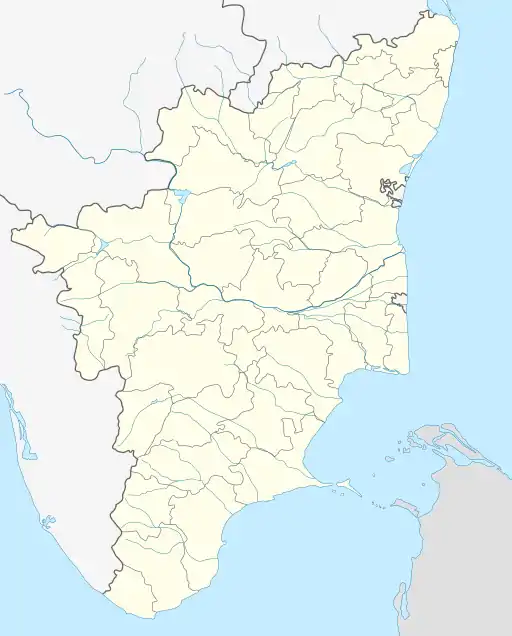Thirukkadaiyur
Thirukkadaiyur (Thirukadavur) is a temple town on the east coast of Tamil Nadu, about 300 km south of Chennai and 15 km north of Karaikal.
Thirukkadaiyur
Thirukkadavur | |
|---|---|
village | |
 Thirukkadaiyur Location in Tamil Nadu, India  Thirukkadaiyur Thirukkadaiyur (India) | |
| Coordinates: 11°4′27″N 79°48′31″E | |
| Country | |
| State | Tamil Nadu |
| District | Mayiladuthurai |
| Languages | |
| • Official | Tamil |
| Time zone | UTC+5:30 (IST) |
| Vehicle registration | TN82 |
The famous Amritaghateswarar - Abirami Temple of Tirukkadaiyur is associated with the legends of Markandeya and Abirami Pattar, which is a replica. The original temple, Thirukkadaiyur Mayanam, now called Thirumeignanam, built in the 11th century, was ravaged by the sea and is in ruins now. People worship and pray at Thirukkadaiyur temple for long life.
Brahmapureeswarar Temple at Thirukadaiyur Mayanam or Brahmapureeswarar Temple Thirumeiganam, Pillaiperumalnallur, another famous Padal Petra Shiva Sthalam is located nearby, to the east.[1]
Legend
Mrikandu
This is one of the holy places of Saivism today. Legend has it that Mrikandu, a sage and devotee of Lord Siva, prayed to God to bless him with a son. God appeared and gave him a choice to select the type of child he wanted - an honest responsible and virtuous son who would live only for 16 years or a son who would live for 100 years but whose behavior is bad. Mrikandu chose the former.
Markandeya
The boy, Markandeya, also grew up to be an ardent devotee of Siva. The destined time came, when Yama (the lord of death) tried to snatch the life of the boy. Markandeya went to the temple and clutched at the Siva Lingam in a bid to escape death. Pleased by the boy's belief, Siva rescued him from death, incarnating him as Kalantaka (the ender of death).
Shastiapthapoorthi (60th birthday), Bhimaradha Shanthi (70th birthday), Sadabishegam (80th birthday) and other Ayul Shanthi fire worships are very famous here.
Temples
The Amritaghateswarar - Abirami Temple of Tirukkadaiyur is associated with the legends of Markandeya and Abirami Pattar.